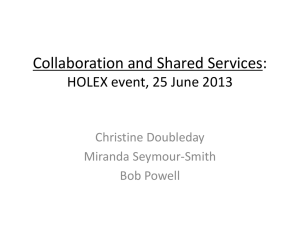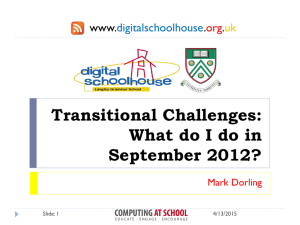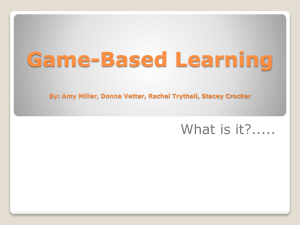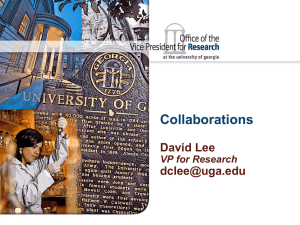PPT Version - Child Care and Early Education Research Connections
advertisement
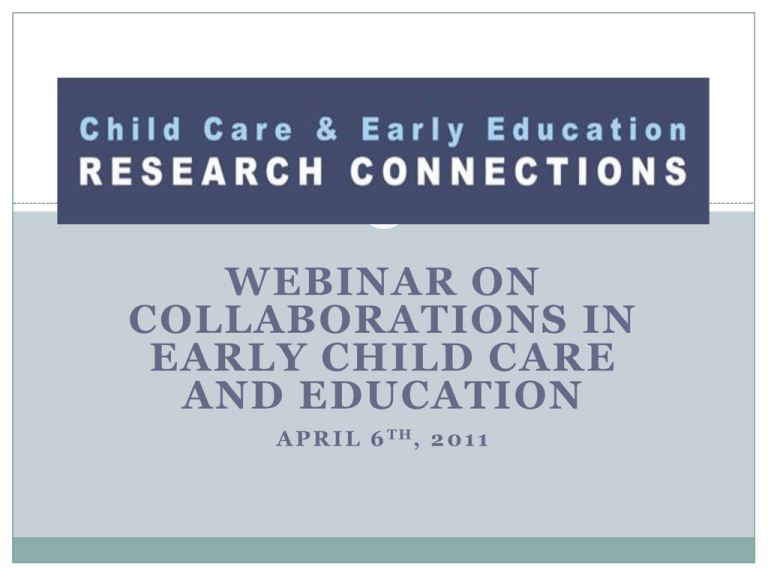
WEBINAR ON COLLABORATIONS IN EARLY CHILD CARE AND EDUCATION A P R I L 6 TH, 2 0 1 1 Instructions for GoToWebinar Menu Window To hide Control Panel To show Control Panel View Webinar in Full Screen Mode/Minimize Full Screen Mode Green arrow means hand is NOT raised (Click to raise your hand) Red arrow means hand IS raised (Click to lower your hand) *Please use *6 or a mute button to silence your telephone when you are not speaking* To unmute your phone press *6 a second time. Collaborations in Early Child Care and Education Facilitator: Dr. Beth Rous- University of Kentucky Presenters: Dr. Jessica Sowa- University of Colorado Dr. Rolf Grafwallner- Maryland State Department of Education Dr. Heather Rouse- Philadelphia Policy and Analysis Center Materials from the meeting are available on Research Connections (www.researchconnections.org) under 'Collaborative Projects' Collaborations in Early Child Care and Education Workgroup Meeting, May 2010 Overall goal To construct a framework for research and evaluation regarding collaborations in early care and education Parameters of discussion State-level collaboration Early education programs – child care, Head Start, prek, early intervention, and early childhood special education Process of collaborating (vs. collaborative institution/body) Collaborations in Early Child Care and Education Broad questions addressed at the workgroup meeting What is known, what needs to be known, and what are the appropriate approaches to take to further research and evaluation in the field? What are the important measurement and design issues? How can research help identify effective collaboration? What about these collaborations is effective? For whom are these collaborations effective? Collaborations in Early Child Care and Education Setting the context Increased emphasis on cross sector collaboration High need for Collaborative Leadership “a potential solution for easing the burden” on leaders through “shared responsibility and mutual accountability toward a common goal or goals” (Arnold, 2004, p. 5). Key aspects of collaborative leadership mutual openness and trust, individual commitment and organizational purposes, shared vision of goal accomplishment reinforced through shared experiences and action (Bryk & Schneider, 2002; Donaldson, 2006; Kouchanek, 2005; Telford, 1996). Collaborations in Early Child Care and Education The Reality Need to build relationships again and again and again….. Constant changes in leadership roles Fighting the natural urge to work with those who are closely aligned in philosophy, areas of interest, etc. Strong collaborative relationships can take extensive human and fiscal resources to build can produce lasting impacts on programs, children and families, but…… are extremely easy to disrupt or destroy by a change in program focus, policy or people. Collaborations in Early Child Care and Education Collaborations in Early Child Care and Education Coming Next….. Clarifying Questions – use chat Hold other questions/comments to end – raise hands Logic Model: Dr. Jessica Sowa, University of Colorado Maryland’s Early Childhood System: Dr. Rolf Grafwallner, Maryland State Department of Education Kids Integrated Data System (KIDS): Dr. Heather Rouse, Philadelphia Policy and Analysis Center Collaborations in Early Child Care and Education Logic Model This logic model is a theory of change model (drawing on the Kellogg Foundation logic model types) Built on the following assumptions: Actors involved at state level are the policy level actors—referred to as stakeholders When examining how the inputs into the collaboration are converted into a process—concerned with the quality of the process Context matters—need to assess the environment in which these collaborations are being implemented Collaborations in Early Child Care and Education Issues to Consider with the Logic Model Examples of how this would work in practice Designed for research, but could be tailored for evaluation purposes Could unpack the different components (A, B, C, D, and E) depending on the type of evaluation or the research question being explored Still a work in progress—needs to be applied to fully explicate the connections between the components Collaborations in Early Child Care and Education Maryland – Process Components of Collaboration Context 1: Consolidation of all early care and education programs at the Dept. of Education Context 2: Early Childhood Advisory Council – overarching early education policy Collaborations in Early Child Care and Education Context 1: Norms of collaboration defined by state agency within executive branch (e.g., legislative mandate, regulations, agency mission and policies) Facilitation by one Division working collaboratively with three other divisions (i.e., special education; food and nutrition, libraries, student and family support) Problem focus on school readiness and early learning opportunities gap (e.g., accountability system; strategic planning process) Support (e.g., agency infrastructure; budgeting process, enforcement authority) Collaborations in Early Child Care and Education Context 2: Norms of collaboration (e.g., Governor’s agenda; interestbased negotiations) Facilitation (e.g., state’s EC advisory council; Children’s Cabinet) Problem focus (e.g., school readiness, healthy children) Support (e.g., multi-agency approach; joint funding; legislative committees) Collaborations in Early Child Care and Education Outcomes in Maryland Shared problem definitions (i.e., school readiness; alignment with K-12) Fragmentation (i.e., streamlined decision-making; overlapping missions) Improved relationships and trust (e.g., long-term engagement; leadership (State Superintendent)) Increased collaborative activity (e.g., joint funding; division of labor; local collaboration models) Increased political will (i.e., Children’s Cabinet; legislative committees; Governor; State Board of Education) Collaborations in Early Child Care and Education Issues: Maintaining transparency (e.g., dissemination pathways and current updates) Inclusion of Federal programs and mandates (e.g., redundancies and Federal to local oversight) Collaboration between LEAs and EC partners (e.g., transition practices and control of funding/oversight) Kids Integrated Data System Heather L. Rouse Philadelphia Policy & Analysis Center April 6th, 2011 Kids Integrated Data System Integrates All Administrative Records for Children & Youth age 0 to 21 Provides Individual & GIS-based Data for Policy Analysis, Community Planning & Research Individual & Aggregate Kids Integrated Data System WHO University Researchers, Public Service Providers, & local Foundation Co-Founders: WHAT John Fantuzzo, Dennis Culhane, & Trevor Hadley; University of Pennsylvania Integrated Individual Child/Youth Data • Child Welfare & Human Services • Vital Statistics • Health • Department of Behavioral Health (mental health) • Early Intervention • Public Education • Emergency Shelter Services and Supportive Housing Value of Building Research Capacity with Municipal Administrative Data It is there. An infrastructure exists to collect it and maintain it. It can be used to inform decisions at multiple levels It can be used to build comprehensive models to foster understanding and to stimulate strategic planning. It can create dialogue across agencies serving the same populations of children. It can be used to share with the community to build support and focus community-wide action Challenges of Collaboration: A Tale of Two Realities Government Policy & Practice Academic Research Government Policy & Practice Data infrastructure? Research capacity? Time for partnerships? You want the answer When? Academic Research Integration of Diverse Realities Research Policy KIDS HOW? Partnership Agreements & Protocol Improve SHARE Improvement of policies, practices, data resulting from the research Networks established to share findings with relevant stakeholders and policy makers City research & evaluation applications USE INTEGRATE GET Scientific processes to integrate data with precision Legal & ethical agreements to get individual data from multiple municipal agencies KIDS Legal Issues HIPAA: Health Insurance Portability & Accountability Act FERPA: Family Educational Rights & Privacy Act Requirements for Use of Information: Practical Use for agencies Security Standards & Protocol for data use KIDS Ethical Issues: Disconnects between Research & Practice The research will not benefit our agency We will lose control of how our data are used Researchers will take our data and run with no regard for us or our work with children The findings may contradict our own reports Negative findings will be shared without our input creating misunderstandings The KIDS Policy Group Purpose: Govern all KIDS research projects to ensure agency-research connections Process: • Each agency elects 1 representative • All research proposals are reviewed & voted • Approved projects must adhere to KIDS Researcher Agreements • Researcher conducts research & informs the Policy Group at every step KIDS Data Integration Process Routine data-dumps from agencies Scientific audit system for “research-ready” data KIDS Policy Group Approval for specific projects Dataset integration tailored to project parameters De-identified or aggregate data shared with researchers Sample KIDS Policy Research • How do multiple risk factors impact school readiness? • What is the overlap between DOE Special Education Services and Community Mental Health Services? • How are educational outcomes affected by experiences in multiple public systems (e.g., Child Welfare & Shelter Services)? • What are the educational outcomes for children using different homelessness support services? • What are the characteristics of Out-of-School youth? • Are there disparities in care for children with ADHD? Responses to Research Findings • Built Capacity: Early Care & Education Interview • Principal Training Academy for Kindergarten Transitions • Latino Taskforce on Early Childhood Education • Grant funding to establish a Summer Academy for children with no prior preschool experience • National funding for Out-of-School Youth interventions • Pilot project: Social Workers in Homeless shelters For More Information about KIDS: Heather L. Rouse, Ph.D. Deputy Research Director Philadelphia Policy & Analysis Center Heather.Rouse@Phila.gov (or) rouseh@gse.upenn.edu





